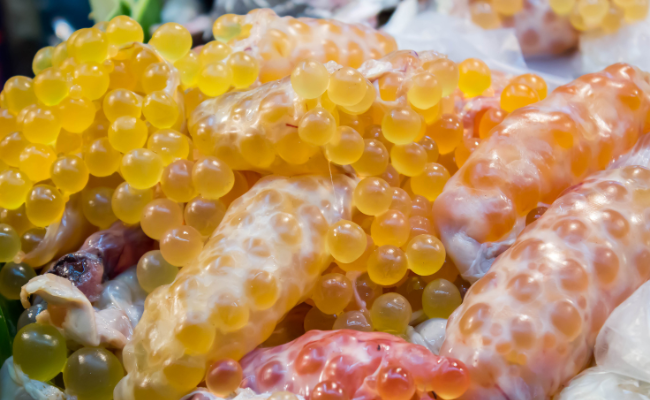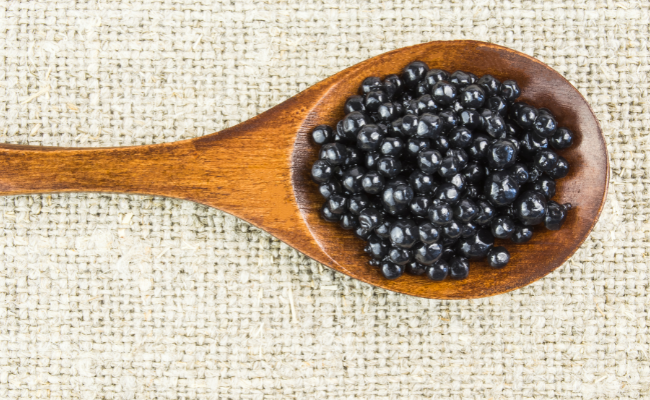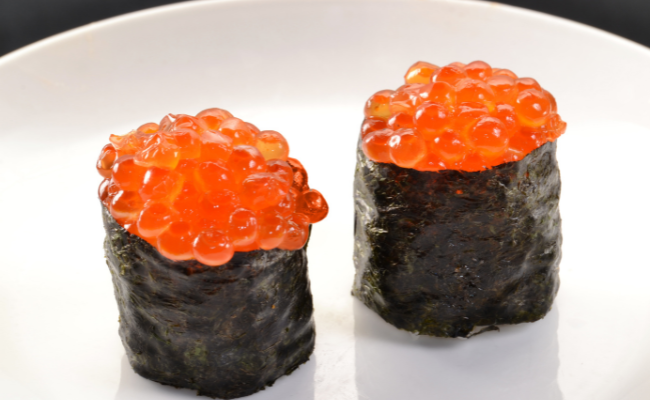Cooking with Fish Eggs: Tips and Tricks for Perfect Results
Ready to try something new and exciting in the kitchen? Look no further than fish eggs! Many often overlook these delicacies in home-cooking. But they can add a whole new flavor and texture to your meals.
With a few tips and techniques, you can elevate your cooking game and create perfect dishes for a healthy diet using fish roe. In this article, we’ll explore the world of cooking with fish eggs, from selecting the correct type of fish roe to mastering the art of preparing it.
We’ll also share some tips to help you get the best results possible and introduce you to new dish combinations and delectable recipes that showcase its unique flavors. Prepare to expand your culinary horizons and impress your guests with fish egg creations!
What Are Fish Eggs?
 Fish eggs, or roe, are eggs produced by female fish and other marine animals like sea urchins, shrimp, and squid. Depending on the fish species, they sometimes appear reddish-orange and come in various shapes, sizes, and colors.
Fish eggs, or roe, are eggs produced by female fish and other marine animals like sea urchins, shrimp, and squid. Depending on the fish species, they sometimes appear reddish-orange and come in various shapes, sizes, and colors.
Fish roe is a delicacy that many have enjoyed worldwide for centuries. Cooking with fish eggs is a fascinating culinary art. You can add them to various dishes, owing to their unique flavor and texture.
Fish roe isn’t just delicious but also highly nutritious. These tiny eggs are full of essential vitamins, proteins, and healthy fats that studies have shown can reduce the risk of developing heart diseases and symptoms of rheumatoid arthritis.
With the proper cooking techniques, fish roe can be a valuable addition to a healthy diet.
You may also like: Yummy Desserts that Don’t Need Eggs
Types of Fish Eggs
Fish roe comes in various types, each with a distinct texture and flavor profile. Here are some of the popular ones:
- Trout roe
- Caviar
- Salmon Roe
- Flying fish roe
Differences Between the Various Fish Roe Types

Here’s how to differentiate between various types of fish eggs:
Caviar
Caviar is the most expensive type of fish roe typically harvested from sturgeon. It has a small size, delicate texture, and rich buttery flavor.
Salmon Roe
Also known as ikura, salmon roe is typically large and has a bright orange color. The eggs have a soft texture and a slightly salty, buttery flavor.
Flying Fish Roe
The eggs are small and have a crunchy texture with a bright, popping flavor. This type of roe comes in various colors, including orange, red, and black. Flying fish roe is perfect for adding color, like squid ink, and flavor to sushi rolls or as a garnish for other seafood dishes.
Trout Roe
Trout roe is smaller and has a range of colors from pale yellow to dark red. The eggs have a firmer texture than salmon roe and a slightly nutty flavor.
Nutritional Benefits of Fish Eggs

Protein
They are a rich source of protein, which is essential for any physical activity. Protein is crucial in building and repairing tissues in the body.
Omega-3 Fatty Acids
Fish eggs contain omega-3 fatty acids essential for maintaining good heart health, supporting brain function, and reducing inflammation.
You may also like: Best scrambled eggs recipe
Vitamins and Minerals
They are a good source of vitamins and minerals, including vitamin D, B12, selenium, and iron.
Antioxidants
Fish eggs, including salmon roe, are rich in antioxidants like astaxanthin, which can effectively shield the body from oxidative stress and inflammation.
Low in Calories
Fish roe is relatively low in calories compared to other protein-rich foods, making them a good option for those watching their calorie intake. Pair them with foods high in dietary fiber and other nutrients, filling you up for the entire day.
Tips for Selecting High-Quality Fish Eggs

- Ensure that the eggs you choose are fresh and clean.
- Look for eggs that have a consistent color and are free from discoloration.
- Pay attention to the texture of the fish roe; it should be firm but not hard.
- Go for a fish roe that is uniform in size.
- Well-packaged fish roe and stored correctly are the best for consumption.
Potential Health Risks
Although fish eggs are typically okay to eat, some possible health hazards are associated with consuming them. Here are some things to be aware of:
Mercury Contamination
Some fish species, such as swordfish and tuna, contain high levels of mercury. High mercury levels can harm pregnant women, nursing mothers, and young children.
Allergic Reactions
People with fish allergies can trigger an allergic reaction by consuming fish eggs. The symptoms may vary from mild to severe, including hives, breathing difficulties, and even anaphylaxis.
Bacterial Contamination
Like all seafood, fish eggs can be contaminated with harmful bacteria like salmonella or listeria, which can cause foodborne illnesses.
High Sodium Content
Some fish eggs, like caviar, can have a lot of salt. In some cases, overeating can lead to health issues such as high blood pressure.
To minimize these risks, it is essential to follow some precautions when consuming it:
- Buy eggs from reputable sources that follow good manufacturing practices and ensure that the eggs are fresh and properly stored.
- Limit your consumption, particularly those from larger, longer-living fish such as tuna, swordfish, and shark, which are more likely to contain high levels of heavy metals.
- Make sure to cook the fish roe all the way through before eating them to lower the chances of harmful bacteria or parasites.
- Avoid consuming fish eggs altogether if you are pregnant, nursing, or have a weakened immune system.
Cooking Foods with Fish Eggs

Cook the eggs and season with salt and spices as desired. You can add them to salads, sushi, and pasta dishes.
You may also like: How long do hardboiled eggs last?
In addition, you can cook roe using various methods depending on the type of roe and personal preference. Here are some common cooking methods:
Boiling
This method involves placing the roe in high heat and boiling water for a few minutes until it is cooked thoroughly. It is a simple and quick way to cook roe and can be used for various types of roe, including salmon roe, trout roe, and cod roe.
Grilling
Grilling roe can impart a smoky flavor and add a nice char to the exterior. It is best suited for larger roe, such as salmon roe.
Smoking
Smoking roe can add a rich and complex flavor. It is best suited for larger roe, such as sturgeon roe, and is often used in traditional dishes like caviar. Using different types of wood can also influence the flavor.
Curing
Curing roe involves rubbing it with salt, sugar, and sometimes other seasonings, then letting it sit for several hours or overnight. This method can be used for various types of roe and is often used to make bottarga, a cured fish roe used in Italian cuisine.
Remember to carefully handle fish eggs, which are delicate and easily break. Also, use fresh, high-quality roe for the best results.
Storage and Handling Fish Eggs
When it comes to storing and handling fish eggs, there are several tips to keep in mind to ensure their freshness and quality. Here are some recommendations:
- Keep the eggs in their original packaging.
- Store the eggs in the refrigerator.
- Use the eggs within a few days.
- Handle the eggs with care.
Conclusion
Cooking with fish eggs is a culinary art that has gained widespread popularity due to its delicious and nutritious nature. These eggs are full of vitamins, minerals, and omega-3 fatty acids. Still, eating them in moderation is crucial to avoid any risk of heart disease.
There are numerous preparation methods for cooking fish eggs that are worth exploring. Whether you’re using caviar, salmon roe, or other fish roe, these tiny eggs can add a unique flavor and texture to your dishes.

